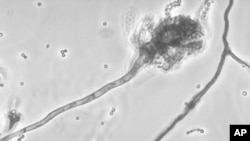The U.S. Centers for Disease Control says the number of confirmed cases of a rare outbreak of fungal meningitis linked to steroid shots rose on Friday from 34 to 47. The number of confirmed deaths remained at five.
The new tally sent a chill through the U.S. medical community as investigators scrambled to notify hundreds, and possibly thousands, of patients across the country that steroid injections administered to the spinal cord for back pain may have been contaminated with a fungus.
Investigators say patients in seven states receiving injections of the drug (methyl-prednisolone acetate) between July and September are believed to be most at risk.
Medical detectives have narrowed their search for the source of the contamination to a specialty pharmacy in ((the U.S. state of)) Massachusetts. The suspect fungus was found this week in at least one sealed vial of the steroid solution at the company's manufacturing facility. More than 17,000 vials were immediately recalled.
Meningitis is an inflammation of the lining of the brain and the spinal cord. Dr. John Jernigan, an epidemiologist at the Centers for Disease Control, says the initial symptoms of fungal meningitis in patients can vary.
"The symptoms that they are experiencing are those that we sometimes see in cases of meningitis, such as fever, new or worsening headache, sometimes neck stiffness. We've also seen in a few patients, signs and symptoms of stroke, sudden onset of slurred speech, dizziness, difficulty walking, sudden weakness, etc," said Jernigan,
Compounding pharmacies often custom-mix medications into doses and forms that may not be commercially available.
Dr. William Schaffner, chairman of the Department of Preventative Medicine at the Vanderbilt Medical Center, tells VOA the meningitis outbreak shows compounding pharmacies need better regulations.
"The Food and Drug Administration seems not to have oversight, regulatory oversight, over these compounding pharmacies. That's got to be changed. There is no reason that in the 21st century patients in the United States should be receiving questionable medications," said Schaffner.
He also warned there could be additional cases of fungal meningitis because of its incubation period.
Health officials say so far, the majority of the deaths and illnesses linked to the outbreak have occurred in the state of Tennessee.
The new tally sent a chill through the U.S. medical community as investigators scrambled to notify hundreds, and possibly thousands, of patients across the country that steroid injections administered to the spinal cord for back pain may have been contaminated with a fungus.
Investigators say patients in seven states receiving injections of the drug (methyl-prednisolone acetate) between July and September are believed to be most at risk.
Medical detectives have narrowed their search for the source of the contamination to a specialty pharmacy in ((the U.S. state of)) Massachusetts. The suspect fungus was found this week in at least one sealed vial of the steroid solution at the company's manufacturing facility. More than 17,000 vials were immediately recalled.
Meningitis is an inflammation of the lining of the brain and the spinal cord. Dr. John Jernigan, an epidemiologist at the Centers for Disease Control, says the initial symptoms of fungal meningitis in patients can vary.
"The symptoms that they are experiencing are those that we sometimes see in cases of meningitis, such as fever, new or worsening headache, sometimes neck stiffness. We've also seen in a few patients, signs and symptoms of stroke, sudden onset of slurred speech, dizziness, difficulty walking, sudden weakness, etc," said Jernigan,
Compounding pharmacies often custom-mix medications into doses and forms that may not be commercially available.
Dr. William Schaffner, chairman of the Department of Preventative Medicine at the Vanderbilt Medical Center, tells VOA the meningitis outbreak shows compounding pharmacies need better regulations.
"The Food and Drug Administration seems not to have oversight, regulatory oversight, over these compounding pharmacies. That's got to be changed. There is no reason that in the 21st century patients in the United States should be receiving questionable medications," said Schaffner.
He also warned there could be additional cases of fungal meningitis because of its incubation period.
Health officials say so far, the majority of the deaths and illnesses linked to the outbreak have occurred in the state of Tennessee.
Some information for this report was provided by AP, AFP and Reuters.





